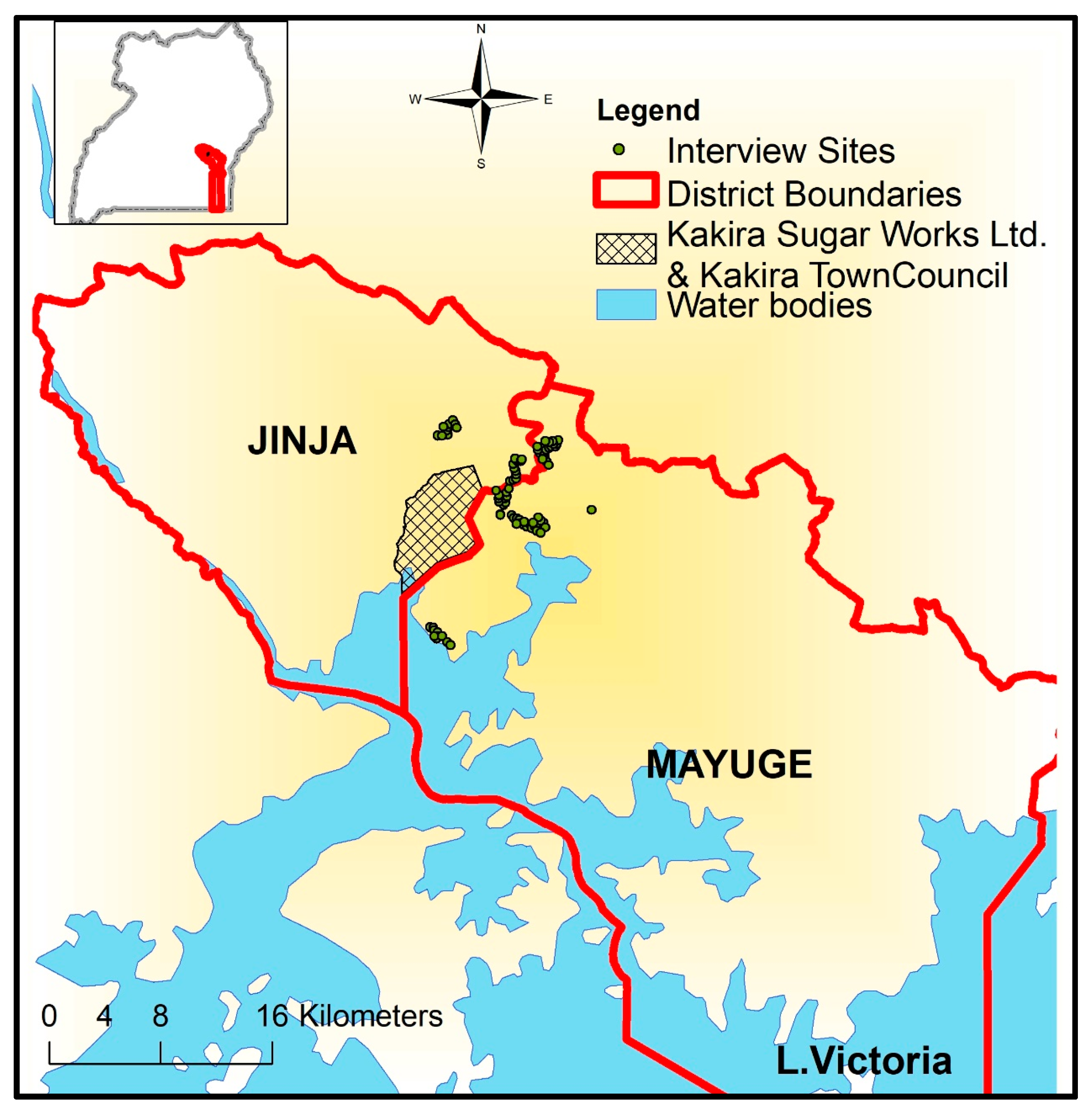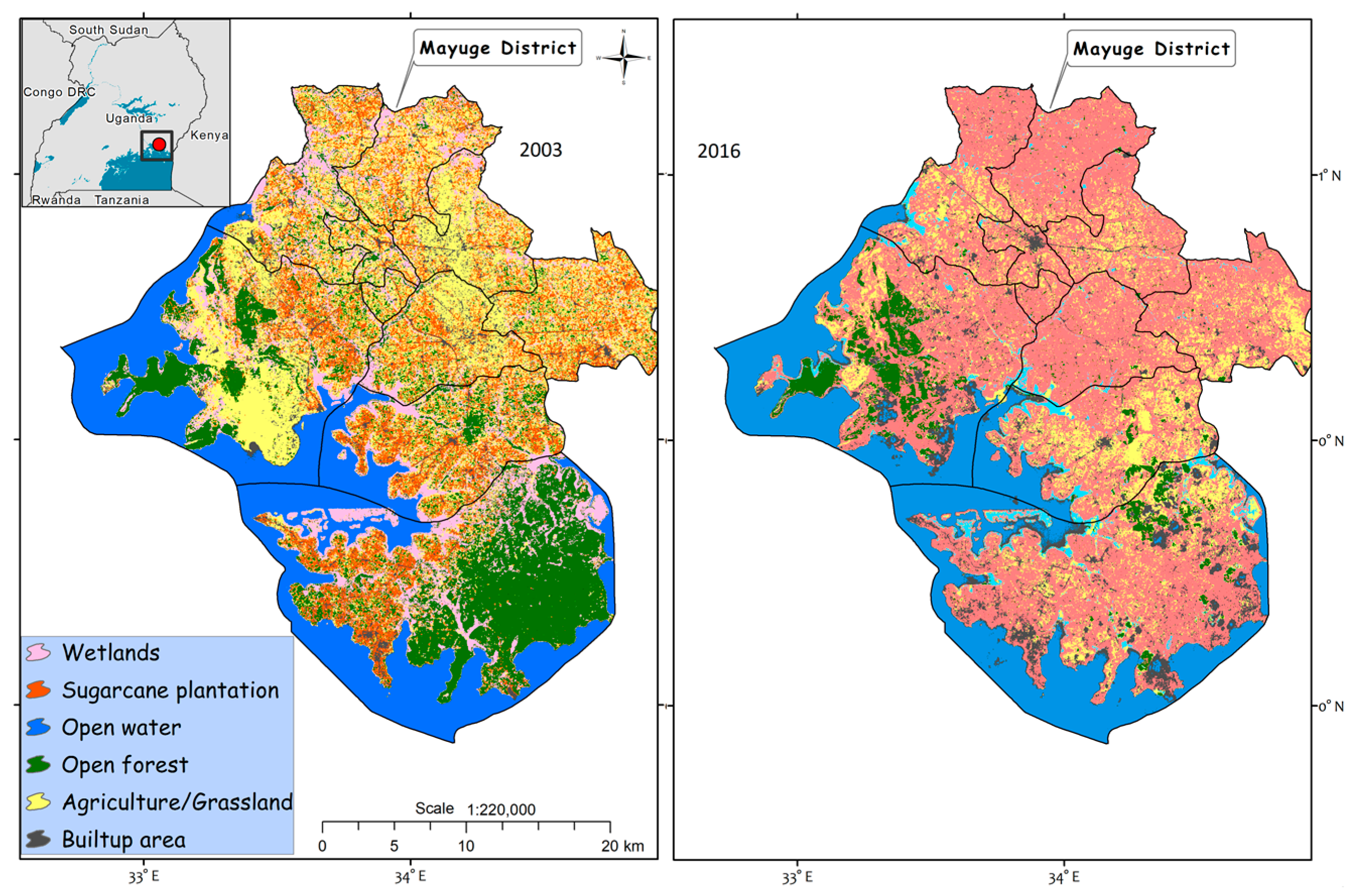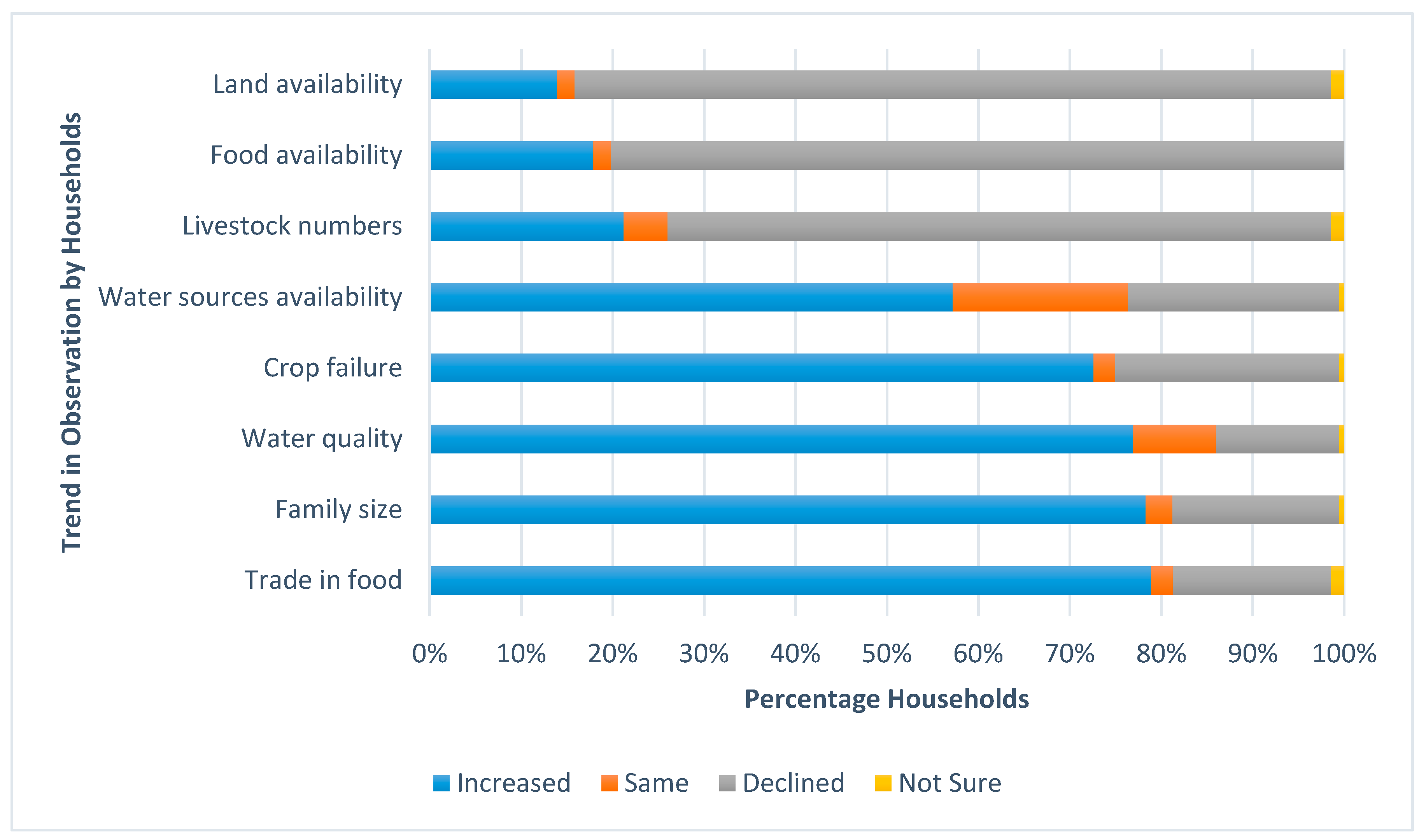Expansion of Commercial Sugarcane Cultivation among Smallholder Farmers in Uganda: Implications for Household Food Security
Abstract
1. Introduction
2. Materials and Methods
2.1. Description of the Study Area
2.2. Methods
2.2.1. Study Design and Data Collection
2.2.2. Data Analysis
3. Results
3.1. Description of Respondents
3.2. Dynamics of Sugarcane Plantation Coverage in Mayuge District
3.3. Food Security, Insecurity and Hunger among Households
3.4. Perceived Trends in Relation to Food Production and Availability
3.5. Relationship between Household Characteristics and Likelihood of Being Food Insecure
4. Discussion
4.1. Food Security Situation and Coping Strategies among Households
4.2. Commercial Agriculture and Its Implications for Food Security among Households
4.3. Perceived Trends in Food Inadequacy and Its Causes
5. Conclusions
Author Contributions
Acknowledgments
Conflicts of Interest
References
- Vink, N. Commercializing agriculture in Africa: Economic, social and environmental impacts. Afr. J. Agric. Resour. Econ. 2013, 9, 1–17. [Google Scholar]
- World Bank. Fact Sheet: The World Bank and Agriculture in Africa. 2013. Available online: http://web.worldbank.org/WBSITE/EXTERNAL/COUNTRIES/AFRICAEXT/0,contentMDK:21935583~pagePK:146736~piPK:146830~theSitePK:258644,00.html (accessed on 22 March 2013).
- OECD/FAO. Agriculture in Sub-Saharan Africa: Prospects and Challenges for the Next Decade. In OECD-FAO Agricultural Outlook 2016–2025; OECD Publishing: Paris, France, 2016; pp. 59–95. [Google Scholar]
- The WorldBank Group. Agriculture, Value Added (% of GDP). Available online: https://data.worldbank.org/indicator/NV.AGR.TOTL.ZS (accessed on 18 April 2018).
- Binswanger, H.P.; von Braun, J. Technological change and commercialisation in agriculture: The effect on the poor. World Bank Res. Observ. 1991, 6, 57–80. [Google Scholar] [CrossRef]
- Clay, J. Palm Oil. In World Agriculture and Environment: A Commodity-by-Commodity Guide to Impacts and Practices; Island Press: Washington, DC, USA, 2004; pp. 203–235. [Google Scholar]
- Zen, Z.; Barlow, C.; Gondowarsito, R. Oil palm in Indonesian socio-economic improvement: A review of options. Oil Palm Ind. Econ. J. 2006, 6, 18–29. [Google Scholar]
- Sheil, D.; Casson, A.; Meifaard, E.; van Nordwijk, M.; Gaskell, J.; Sunderland-Groves, J.; Wertz, K.; Kanninen, M. The Impacts and Opportunities of Oil Palm in South East Asia: What do We Know and What Do We Need to Know; Occasional Paper No. 51; CIFOR: Bogor, Indonesia, 2009. [Google Scholar]
- Nesadurai, H.E.S. Food security, the palm oil–land conflict nexus, and sustainability: A governance role for a private multi-stakeholder regime like the RSPO? Pac. Rev. 2013, 26, 505–529. [Google Scholar] [CrossRef]
- Koczberski, G.; Curry, G.N.; Bue, V. Oil palm, food security and adaptation among smallholder households in Papua New Guinea. Asia Pac. Viewp. 2012, 53, 288–299. [Google Scholar] [CrossRef]
- Mwavu, E.N.; Witkowski, E.T.F. Land-use and cover changes around Budongo Forest Reserve, NW Uganda: Implications for sustainability of the forest/woodland. Land Degrad. Dev. 2010, 19, 606–622. [Google Scholar] [CrossRef]
- Mwavu, E.N.; Ariango, E.; Ssegawa, P.; Kalema, V.N.; Bateganya, F.; Waiswa, D.; Byakagaba, P. Agrobiodiversity of homegardens in a commercial sugarcane cultivation land matrix in Uganda. Int. J. Biodivers. Sci. Ecosyst. Serv. Manag. 2016, 12, 191–201. [Google Scholar] [CrossRef]
- FAO. State of Food Insecurity 2009; Food and Agriculture Organization: Rome, Italy, 2009. [Google Scholar]
- Liverman, D.; Kapadia, K. Food systems and the global environment: An overview. In Food Security and Global Environmental Change; Ingram, J., Ericksen, P., Liverman, D., Eds.; Earthscan: Washington, DC, USA, 2010. [Google Scholar]
- Kung’u, J.B. Food security in Africa: The challenges of researchers in the 21st century. In Advances in Integrated Soil Fertility Management in Sub-Saharan Africa: Challenges and Opportunities; Bationo, A., Boaz, W., Job, K., Joseph, K., Eds.; Springer: Dordrecht, The Netherlands, 2007; pp. 105–113. [Google Scholar]
- Latham, M. Human Nutrition in the Developing World; FAO: Rome, Italy, 1997. [Google Scholar]
- IFPRI (International Food Policy Research Institute). Reaching Sustainable Food Security for all by 2020. Getting the Priorities and Responsibilities Right; IFPRI: Washington, DC, USA, 2002. [Google Scholar]
- Rosegrant, M.W.; Cline, S.A.; Li, W.; Valmonte-Santos, R. Looking Ahead: Long-Term Prospects for Africa’s Agricultural Development and Food Security; IFPRI: Washington, DC, USA, 2005. [Google Scholar]
- Kennedy, E.T. The Effects of Sugarcane Production on Food Security, Health, and Nutrition in Kenya: A Longitudinal Analysis; International Food Policy Research Institute: Washington, DC, USA, 1989; Volume 78. [Google Scholar]
- Rist, L.; Feintrenie, L.; Levang, P. The livelihood impacts of oil palm: Smallholders in Indonesia. Biodivers. Conserv. 2010, 19, 1009–1024. [Google Scholar] [CrossRef]
- Goldemberg, J.; Coelho, S.T.; Guardabassi, P. The sustainability of ethanol production from sugarcane. Energy Policy 2008, 36, 2086–2097. [Google Scholar] [CrossRef]
- U.S. Agency for International Development’s (USAID). Uganda Vulnerability to Climate Change Assessment Report; United States Agency for International Development: Washington, DC, USA, 2013.
- Phillips, O.; Gentry, A.H. The useful plants of Tambopata, Peru: 1: Statistical hypothesis test with a new quantitative technique. Econ. Bot. 1993, 47, 15–32. [Google Scholar] [CrossRef]
- SPSS Inc. Released 2008. SPSS Statistics for Windows, Version 17.0; SPSS Inc.: Chicago, IL, USA, 2008. [Google Scholar]
- Hagos, H.; Mengistu, L.; Mequanint, Y. Determining optimum harvest age of sugarcane varieties on the newly establishing Sugar Project in the tropical areas of Tendaho, Ethiopia. Adv. Crop Sci. Technol. 2014, 2, 156. [Google Scholar] [CrossRef]
- U.S. Agency for International Development’s (USAID). Policy Determination of 1992 for Definition of Food Security; United States Agency for International Development: Washington, DC, USA, 1992. Available online: http://www.usaid.gov/policy/ads/200/pd19.pdf (accessed on 17 August 2017).
- Food and Agriculture Organization (FAO). Declaration on World Food Security; World Food Summit; FAO: Rome, Italy, 1996. [Google Scholar]
- Baiphethi, M.N.; Jacobs, P.T. The contribution of subsistence farming to food security in South Africa. Agrekon 2009, 48, 459–482. [Google Scholar] [CrossRef]
- Quandt, S.A.; Arcury, T.A.; Early, J.; Tapia, J.; Davis, J.D. Household food security among migrant and seasonal Latino farmworkers in North Carolina. Public Health Rep. 2004, 119, 568–576. [Google Scholar] [CrossRef] [PubMed]
- Quisumbing, A.R.; Brown, L.R.; Feldstein, H.S.; Haddad, L.; Penã, C. Women: The Key to Food Security; Food Policy Report; The International Food Policy Research Institute: Washington, DC, USA, 1995. [Google Scholar]
- Verchot, L.V.; Van Noordwijk, M.; Kandji, S.; Tomich, T.; Ong, C.; Albrecht, A.; Mackensen, J.; Bantilan, C.; Anupama, K.V.; Palm, C. Climate change: Linking adaptation and mitigation through agroforestry. Mitig. Adapt. Strat. Glob. Chang. 2007, 12, 901–918. [Google Scholar] [CrossRef]
- Howden, S.M.; Soussana, J.-F.; Tubiello, F.N.; Chhetri, N.; Dunlop, M.; Meinke, H. Adapting agriculture to climate change. Proc. Natl. Acad. Sci. USA 2007, 104, 19691–19696. [Google Scholar] [CrossRef] [PubMed]
- Millennium Ecosystem Assessment (MEA). Ecosystems and Human Well-Being: Synthesis; Island Press: Washington, DC, USA, 2005. [Google Scholar]
- Terry, A.; Ryder, M. Improving food security in Swaziland: the transition from subsistence to communally managed cash cropping. Nat. Resour. Forum 2007, 31, 263–272. [Google Scholar] [CrossRef]
- Thrupp, L.A. Linking agricultural biodiversity and food security: The valuable role of agrobiodiversity for sustainable agriculture. Int. Aff. 2000, 76, 265–281. [Google Scholar] [CrossRef] [PubMed]
- Sunderland, T.C.H. Food security: Why is biodiversity important? Int. For. Rev. 2011, 13, 265–274. [Google Scholar] [CrossRef]
- Maitima, J.M.; Gumbo, D.J. Land Use in Sub-Saharan Africa. In Global Change Processes and Impact in Africa: A Synthesis; Otter, L., Olago, D.O., Niang, L., Eds.; East African Educational Publishers: Nairoib, Kenya, 2007; pp. 109–130. Available online: https://cgspace.cgiar.org/bitstream/handle/10568/3016/Land%20%20Use%20Chapter%20Proofs%20pd.pdf?sequence=1&isAllowed=y (accessed on 20 February 2018).
- Jarvis, A.; Lau, C.; Cook, S.; Wollenberg, E.; Hansen, J.; Bonilla, O.; Challinor, A. An integrated adaptation and mitigation framework for developing agricultural research: Synergies and trade-offs. Exp. Agric. 2011, 47, 185–203. [Google Scholar] [CrossRef]
- Adger, N. Vulnerability. Glob. Environ. Chang. 2006, 16, 268–281. [Google Scholar] [CrossRef]
- Locatelli, B.; Evans, V.; Wardell, A.; Andrade, A.; Vignola, R. Forests and climate change in Latin America: Linking adaptation and mitigation. Forests 2011, 2, 431–450. [Google Scholar] [CrossRef]
- Belcher, B.M. Forest product markets, forests and poverty alleviation. Int. For. Rev. 2005, 7, 82–89. [Google Scholar]
- Nkem, J.; Kalame, F.B.; Idinoba, M.; Somorin, O.A.; Ndoye, O.; Awono, A. Shaping forest safety nets with markets: Adaptation to climate change under changing roles of tropical forests in Congo Basin. Environ. Sci. Policy 2010, 13, 498–508. [Google Scholar] [CrossRef]
- Uganda Bureau of Statistics (UBOS). Uganda National Household Survey 2016/17; UBOS: Kampala, Uganda, 2007. [Google Scholar]
- Wheeler, T.; von Braun, J. Climate change impacts on global food security. Science 2013, 341, 508–513. [Google Scholar] [CrossRef] [PubMed]
- Sparovek, G.; Barretto, A.; Berndes, G.; Martins, S.; Maule, R. Environmental, land-use and economic implications of Brazilian sugarcane expansion 1996–2006. Mitig. Adapt. Strateg. Glob. Chang. 2009, 14, 285–298. [Google Scholar] [CrossRef]
- Immink, M.D.C.; Alarcon, J.A. Household income, food availability, and commercial crop production by smallholder farmers in western highlands of Guatemala. Econ. Dev. Cult. Chang. 1996, 41, 319–342. [Google Scholar]
- Kennedy, E.; Cogill, B. The commercialization of agriculture and household-level food security: The case of southwestern Kenya. World Dev. 1988, 16, 1075–1081. [Google Scholar] [CrossRef]
- Hess, T.M.; Sumberg, J.; Biggs, T.; Georgescu, M.; Haro-Monteagudo, D.; Jewitt, G.; Ozdogan, M.; Marshall, M.; Thenkabail, P.; Daccache, A.; et al. A sweet deal? Sugarcane, water and agricultural transformation in Sub-Saharan Africa. Glob. Environ. Chang. 2016, 39, 181–194. [Google Scholar] [CrossRef]
- Hassuani, S.J.; Leal, MR.; de Carvalho Macedo, I. Biomass Power Generation, Sugarcane Bagasse and Trash, 1st ed.; Report PNUD-Programa das Nações Undas Para O Desenvolvimento CTC-Centro de Technologia Canavieira: Piracreaba, Brazil, 2005. [Google Scholar]
- Pankhurst, C. Should Sugarcane Trash be Used as Biofuel for Cogeneration of Left in the Field for its Long-Term Benefits to the Soil Health and Crop Productivity; A Report Prepared for the Sugar Yield Decline Venture; Sugar Research & Development Corporation (SRDC): Queensland, Australia, 2005. [Google Scholar]
- Watson, H.K.; Garland, G.G.; Purchase, B.; Dercas, N.; Griffee, P.; Johnson, F.X. Bioenergy for Sustainable Development and Global Competitiveness: The Case of Sugar Cane in Southern Africa, Thematic Report 1-Agriculture; CARENSA/SEI Special Report Series; SEI: Stockholm, Sweden, 2008. [Google Scholar]
- Vignola, R.; Locatelli, B.; Martinez, C.; Imbach, P. Ecosystem-based adaptation to climate change: What role for policy-makers, society and scientists? Mitigat. Adapt. Strat. Glob. Chang. 2009, 14, 691–696. [Google Scholar] [CrossRef]
- Turner, W.R.; Oppenheimer, M.; Wilcove, D.S. A force to fight global warming. Nature 2009, 428, 278–279. [Google Scholar] [CrossRef] [PubMed]




| Household/Respondent Characteristics | Percentage Respondents |
|---|---|
| 1. Gender | |
| Female | 72.6 |
| Male | 27.4 |
| 2. Age group | |
| ≤20 | 4.2 |
| 21–40 | 45.0 |
| 41–60 | 41.8 |
| 61 and above | 9.0 |
| 3. Level of Education | |
| None | 15.5 |
| Primary Incomplete | 33.8 |
| Primary Completed | 17.4 |
| Secondary (Lower) | 30.0 |
| Secondary (Upper) | 1.9 |
| Post-Secondary | 1.4 |
| 4. Membership to sugarcane out-growers’ group | |
| Household head is a Member | 59.3 |
| Household head is a Non-Member | 40.7 |
| 5. Occupation of household head | |
| Smallholder Farmer | 78.8 |
| Trader/Business Man/Woman | 7.7 |
| Salary/Wage Earner | 5.3 |
| Fishing | 2.9 |
| None | 0.5 |
| Other | 4.8 |
| 6. Main source of income | |
| Smallholder Farming | 78.4 |
| Trade | 9.1 |
| Salary/Wages | 6.7 |
| Fishing | 1.4 |
| Other | 4.3 |
| 7. Mean annual household income (USD) | |
| <27.5 | 14.5 |
| 27.6–137.4 | 31.9 |
| 137.5–275 | 27.1 |
| >275 | 26.6 |
| Household Characteristic | Food Insecure | |
|---|---|---|
| No. of HH (%) | χ2, df, p | |
| Gender | - | |
| Level of education of household head | - | |
| Main occupation of household head | 143 (68.8) | |
| Participate in farmer groups | 52 (35.3) | |
| Decision making | - | |
| Status of access to land | - | 4.8, 1, 0.028 |
| Land size | - | 10.75, 3, 0.013 |
| Land under sugarcane cultivation | - | 4.72, 1, 0.03 |
| Land under food crop cultivation | - | 9.11, 4, 0.058 |
© 2018 by the authors. Licensee MDPI, Basel, Switzerland. This article is an open access article distributed under the terms and conditions of the Creative Commons Attribution (CC BY) license (http://creativecommons.org/licenses/by/4.0/).
Share and Cite
Mwavu, E.N.; Kalema, V.K.; Bateganya, F.; Byakagaba, P.; Waiswa, D.; Enuru, T.; Mbogga, M.S. Expansion of Commercial Sugarcane Cultivation among Smallholder Farmers in Uganda: Implications for Household Food Security. Land 2018, 7, 73. https://doi.org/10.3390/land7020073
Mwavu EN, Kalema VK, Bateganya F, Byakagaba P, Waiswa D, Enuru T, Mbogga MS. Expansion of Commercial Sugarcane Cultivation among Smallholder Farmers in Uganda: Implications for Household Food Security. Land. 2018; 7(2):73. https://doi.org/10.3390/land7020073
Chicago/Turabian StyleMwavu, Edward N., Vettes K. Kalema, Fred Bateganya, Patrick Byakagaba, Daniel Waiswa, Thomas Enuru, and Michael S. Mbogga. 2018. "Expansion of Commercial Sugarcane Cultivation among Smallholder Farmers in Uganda: Implications for Household Food Security" Land 7, no. 2: 73. https://doi.org/10.3390/land7020073
APA StyleMwavu, E. N., Kalema, V. K., Bateganya, F., Byakagaba, P., Waiswa, D., Enuru, T., & Mbogga, M. S. (2018). Expansion of Commercial Sugarcane Cultivation among Smallholder Farmers in Uganda: Implications for Household Food Security. Land, 7(2), 73. https://doi.org/10.3390/land7020073




